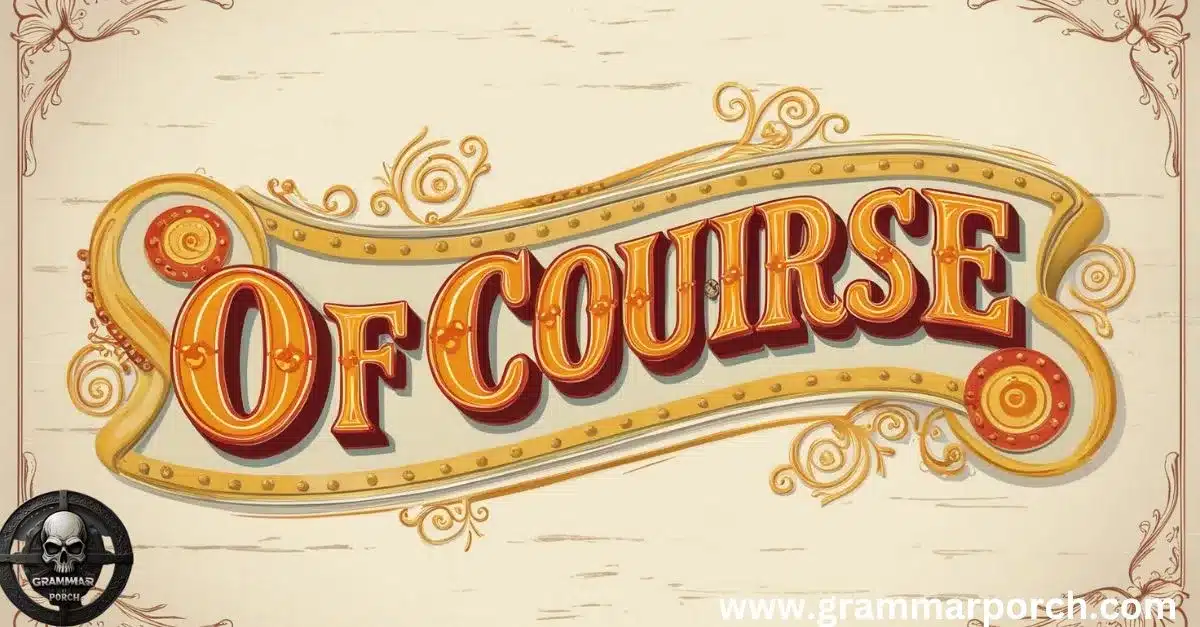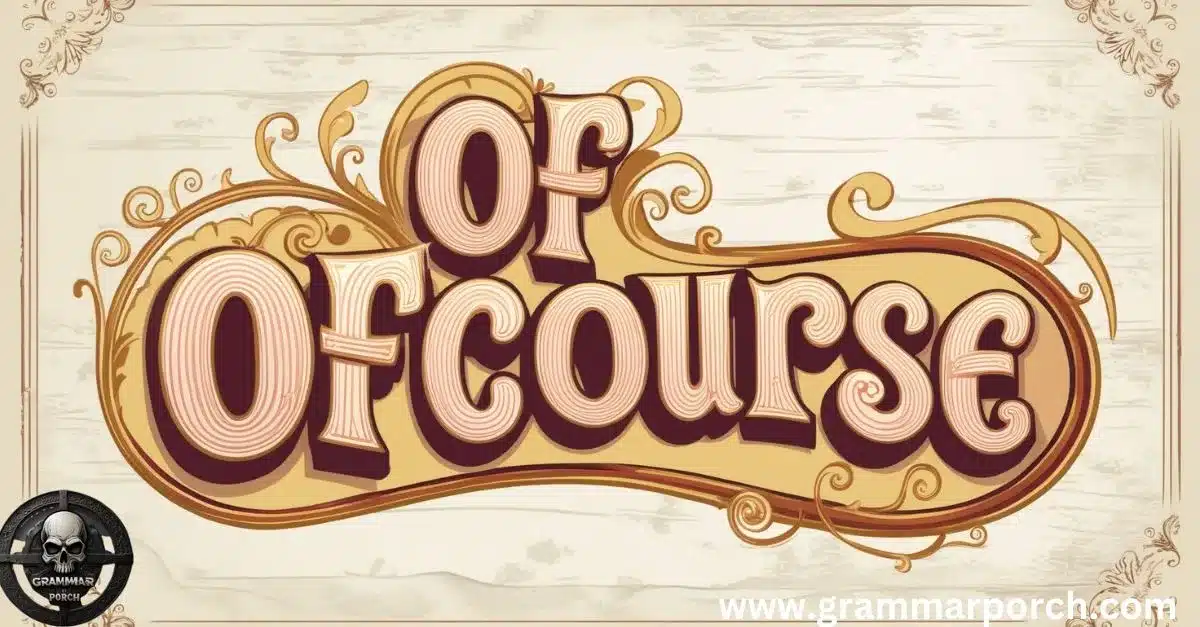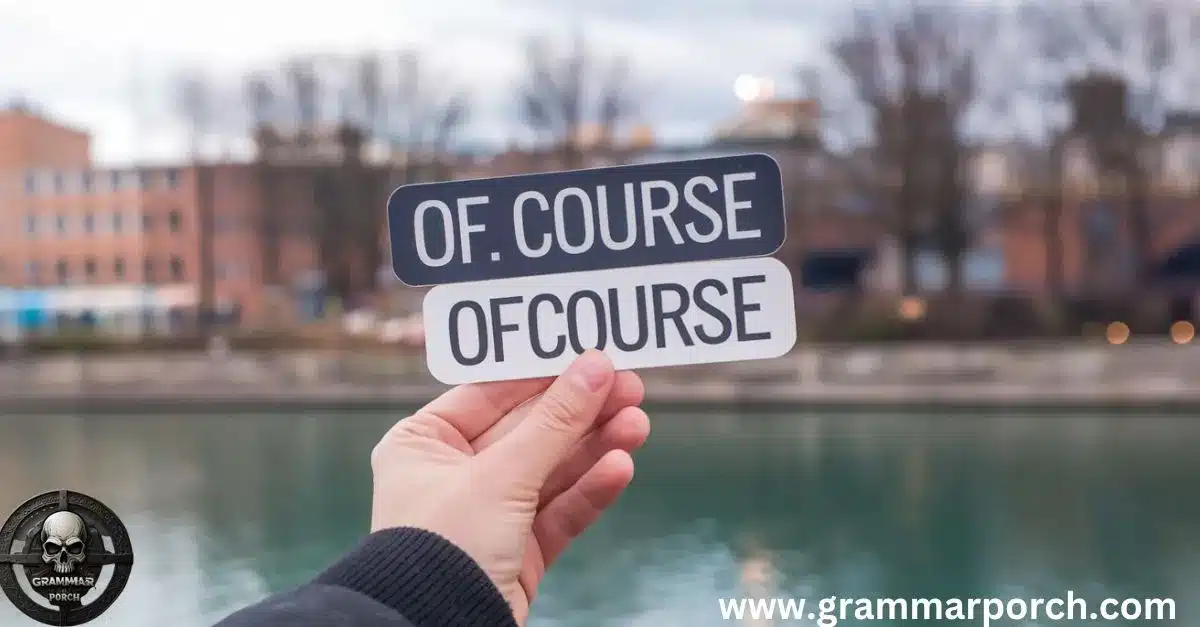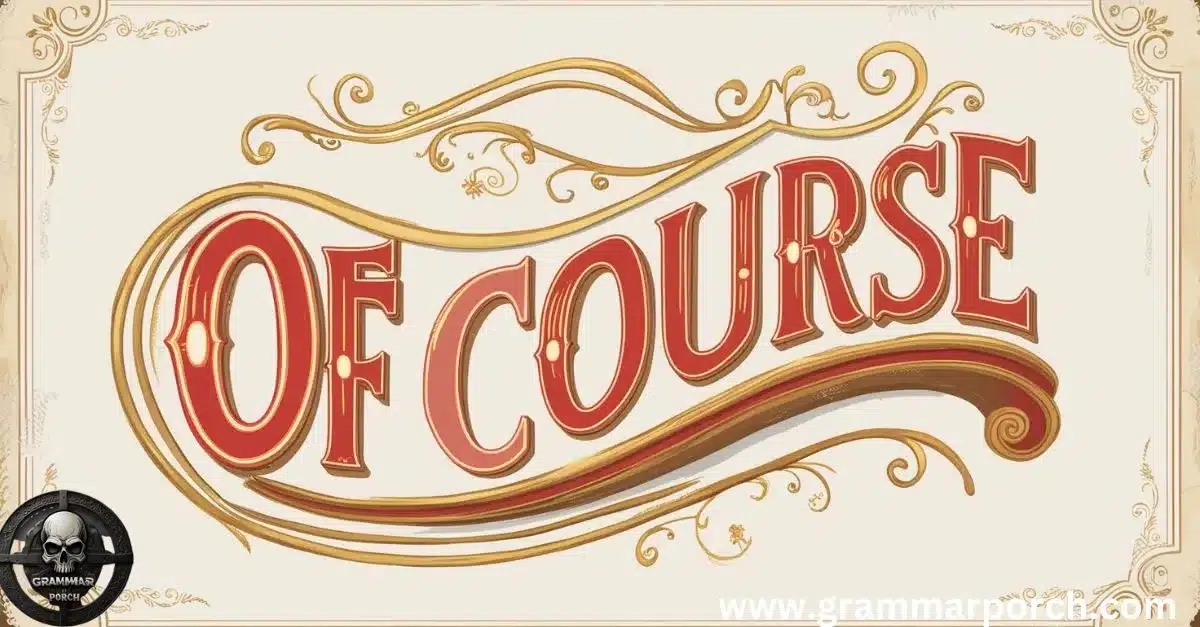Why is There Confusion?
The misunderstanding around “of course” or “ofcourse” stems from how we speak in everyday conversation. When we talk, the words “of” and “course” flow together so naturally that many assume they form a single word. This leads to writing mistakes in both casual and professional settings.
The rise of informal digital communication has only complicated matters further. Text messages, social media posts, and quick emails have made it more common to see these words merged incorrectly, leading to increased language confusion among writers of all skill levels.
Of Course

Definition:
In proper writing, “of course” consists of two distinct words: the preposition “of” and the noun “course.” Together, they form an idiomatic expression that’s recognized by all major English language authorities and style guides. This proper usage maintains the clarity and professionalism of written communication.
Meaning:
When we use “of course” in clear communication, we’re expressing absolute certainty or indicating that something is obvious or natural. It serves as a powerful tool for conveying confidence in both formal and informal contexts.
The phrase carries more weight than a simple “yes” and often implies that the answer or statement should be self-evident.
Ofcourse

Definition
Simply put, “ofcourse” is a spelling error that has no place in proper writing. Despite its frequent appearance in casual communication, it represents a language error that should be avoided in all forms of written expression.
Meaning
Since “ofcourse” isn’t recognized as a legitimate word in the English language, it carries no official meaning. Any intended meaning comes from the correct form, “of course.”
Quick Summary
In effective writing, the distinction is crystal clear. “Of course” represents proper English language usage, while “ofcourse” exemplifies a common writing mistake. Professional writers, educators, and style guides unanimously support “of course” as the correct form for both formal and informal communication.
Pronunciation of Of Course or Ofcourse
The clear communication of this phrase remains consistent regardless of spelling. In American English, we pronounce it as “uhv-kors” (/əv kɔːrs/).
The emphasis naturally falls on “course,” making it a smooth, flowing expression of certainty that explains why many mistakenly combine the words.
When and How to Use Of Course or Ofcourse

Understanding proper usage helps maintain writing clarity. “Of course” fits seamlessly into various contexts, from professional emails to casual conversations. Think of it as a versatile tool in your communication skills toolkit.
Writers should remember that context matters. While “of course” works perfectly in most situations, overusing it in formal documents might make your writing seem casual. For professional writing, consider using it sparingly and mixing in alternative phrases.
Side by Side Comparison Of Course or Ofcourse
| Context | Of Course | Ofcourse |
| Academic Writing | Acceptable ✓ | Never Acceptable ✗ |
| Business Emails | Acceptable ✓ | Never Acceptable ✗ |
| Formal Documents | Use Sparingly ✓ | Never Acceptable ✗ |
| Casual Messages | Acceptable ✓ | Common but Incorrect ✗ |
| Published Works | Acceptable ✓ | Never Acceptable ✗ |
Of Course or Ofcourse: Which Word is More Acceptable
In terms of proper writing, there’s no contest. “Of course” stands as the only acceptable form in all contexts.
This clear phrase maintains its status across all English-speaking countries and writing styles. The single-word version represents a common error that diminishes writing quality.
Common Mistakes and How to Avoid Them
Understanding frequent mistakes helps improve writing accuracy. Writers often stumble by creating variations like “ofcourse,” “of-course,” and even “ofCourse.” These writing mistakes stem from unfamiliarity with proper language conventions.
Origins of Of Course or Ofcourse

Of Course:
The phrase emerged from Middle English, where “of” indicated origin and “course” meant path. This linguistic structure evolved naturally, transforming from a literal meaning about following a path to today’s expression of certainty.
Ofcourse:
No historical basis exists for this spelling. It represents a modern language error born from casual digital communication and misunderstanding.
Synonyms and Similar Terms
Of Of Course:
For effective writing, consider these alternatives:
- Certainly
- Naturally
- Without doubt
- Indeed
- Absolutely
- Obviously
- Most definitely
- By all means
Ofcourse:
Since “ofcourse” isn’t a legitimate word, it has no proper synonyms.
Examples of Of Course or Ofcourse

Of Course:
- “Of course I’ll help you prepare for the presentation.”
- “The museum will be crowded on weekends, of course.”
- “Of course the flowers bloomed – you took such good care of them.”
- “Will you be attending the conference?” “Of course!”
- “Of course she won first place – she practiced for months.”
- “The package will arrive tomorrow, of course, as scheduled.”
- “Of course we should review the document before submitting.”
- “The children are excited, of course, about the field trip.”
- “Of course the restaurant was packed – it’s Valentine’s Day.”
- “Will you need the report by Friday?” “Of course, as discussed.”
Incorrect Usage Examples
- ❌ “Ofcourse we’ll be there early.”
- ❌ “Of-course the meeting starts at nine.”
- ❌ “OfCourse I remembered your birthday.”
- ❌ “Will you help?” “Ofcourse!”
- ❌ “Ofcourse the traffic is terrible today.”
FAQs
Can I use “of course” in academic writing?
Yes, but use it judiciously in formal academic contexts.
Does autocorrect always catch “ofcourse”?
Not always, which makes manual proofreading essential.
Is there any situation where “ofcourse” is acceptable?
No, it’s never considered correct in standard English.
Why do so many people write it as one word?
The natural flow of speech often leads to this writing mistake.
What’s the most professional alternative to “of course”?
“Certainly” or “indeed” often work well in professional settings.
Conclusion
Between “of course” and “ofcourse” ends with a clear winner. In all contexts of proper writing, “of course” stands as the correct form. While language continues to evolve, this particular writing standard remains firm.
Remember, keeping these words separate ensures clear communication and maintains professional credibility in your writing. Whether you’re drafting an important email or writing a casual message, choosing “of course” demonstrates your commitment to proper usage and writing clarity.

Larry is an experienced blogger with a passion for simplifying grammar. With years of expertise in writing and language, he shares insightful tips on punctuation, synonyms, and the intricacies of English grammar at **Grammar Porch**. His approachable style helps readers improve their writing skills with ease.

